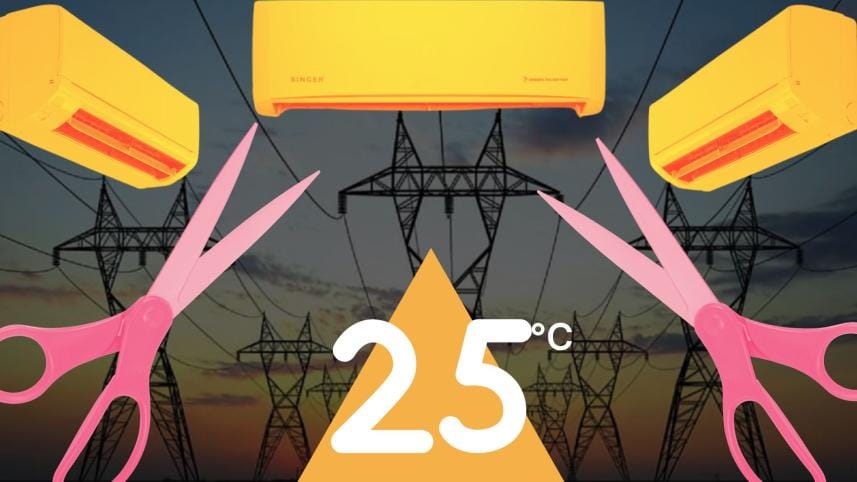We must be economical in our energy use

Bangladesh faces another summer of surging power demand. This year, the irrigation season and Ramadan both coincide with summer, adding to the demand. In the face of this challenge, the Ministry of Power, Energy, and Mineral Resources's (MPEMR) efforts to enforce energy efficiency among consumers to curb demand growth appear short-sighted.
The ministry's recent circular restricts private and public sectors from setting air conditioners (ACs) below 25 degrees Celsius. Media reports suggest that the government may even disconnect electricity connections for those running ACs at lower temperatures and implement load shedding if power distribution utilities observe excessive load in an area. Enforcing such measures will be difficult.
In a developing economy like Bangladesh, where disposable incomes and aspirations are growing, consumer awareness about energy efficiency is a key lever to changing behaviour. On the supply side, ensuring the availability of high-quality appliances and displaying energy efficiency standards on such items is critical. Finally, given the high upfront costs of switching to efficient appliances, the government may also want to consider financial incentives to accelerate the transition.
Bangladesh's per capita income increased 9.67-fold between 1990 and 2024, resulting in higher disposable incomes. Many can now afford ACs and purchase multiple fans to cope with the summer heat. Additional cooling demand during the summer is estimated to be between 4,000 megawatts (MW) and 5,000 MW, according to ballpark estimates by the Institute for Energy Economics and Financial Analysis (IEEFA), based on the country's daily power sector data.
There was roughly a 7,000 MW difference between the summer peak demand in 2024 and the winter peak demand from November 2024 to February 2025. The difference between peak summer and winter demand is attributable to cooling and irrigation needs. The power demand for irrigation is around 3,000 MW.
As Ramadan begins in March, people will have more gatherings and activities at home during the evening, adding to the demand for summer cooling. This will require the Bangladesh Power Development Board (BPDB) to generate more power, even as it grapples with weak financial conditions and the ongoing dollar crisis.
Studies show that increasing an AC's temperature by just one degree can save up to six percent of energy, a strategy Bangladesh should pursue to reduce energy wastage. However, expecting consumer behaviour to change overnight through strict regulations may prove futile. While monitoring temperatures in public institutions may be feasible, doing so for residential users will increase monitoring costs without delivering the intended results. Moreover, since many people use efficient ACs, their energy consumption—even at 23 degrees Celsius—may be lower than that of inefficient units.
Furthermore, power demand will likely peak during Ramadan prayer times between 8pm and 9:30pm across the country, making it difficult to manage sudden spikes in power demand in different areas.
On the other hand, people sometimes tend to waste resources. Despite buying efficient air conditioners to save energy, some still set the temperature at 20 degrees Celsius due to a lack of understanding of energy efficiency. Likewise, fans in the market range from 35 watts to 120 watts, but without precise information and technical knowledge, consumers often choose a higher-wattage fan to save on upfront costs.
Consumers with sufficient disposable income and entrenched habits often pay their monthly electricity bills without considering the impact on the nation's energy crisis. Most people are unaware of how electricity reaches their homes. For example, less than 40 percent of the primary energy used in power generation reaches end consumers, considering the average efficiency (42.86 percent) of power plants and transmission and distribution (T&D) losses (10.06 percent).
Therefore, efforts to promote energy conservation and efficiency may fail without awareness campaigns to change consumer behaviour and impart knowledge on energy-saving practices. A long-term energy efficiency strategy must be devised, incorporating measures to enhance people's awareness and capacity to make informed decisions when purchasing efficient appliances. The strategy should allocate sufficient funding to the Sustainable and Renewable Energy Development Authority (SREDA) to help organise awareness-raising events over an extended period, transforming Bangladesh into an energy-conscious country.
Additionally, energy efficiency standards and labelling will help consumers choose energy-saving appliances. SREDA should accelerate the establishment of minimum energy performance standards for different appliances. It may assess and recommend financial incentives to reduce the high upfront costs and increase the adoption of energy-efficient appliances. Finally, the strategy should emphasise monitoring the availability of high-quality appliances in the market.
While the installed power generation capacity in 2022 indicated sufficient supply for the country, policymakers struggled to meet demand consistently soon after. Although the government's focus on enhancing energy conservation is commendable, for a lasting impact on the country's power sector, it must adopt a long-term strategy to shape consumer behaviour and promote energy consciousness.
Shafiqul Alam is lead energy analyst for Bangladesh at the Institute for Energy Economics and Financial Analysis (IEEFA).
Views expressed in this article are the author's own.
Follow The Daily Star Opinion on Facebook for the latest opinions, commentaries and analyses by experts and professionals. To contribute your article or letter to The Daily Star Opinion, see our guidelines for submission.




 For all latest news, follow The Daily Star's Google News channel.
For all latest news, follow The Daily Star's Google News channel.
Comments